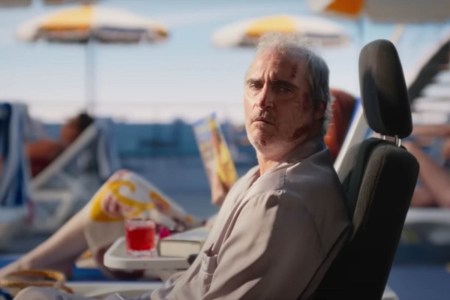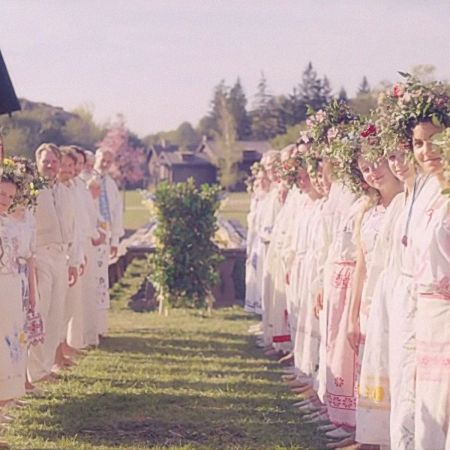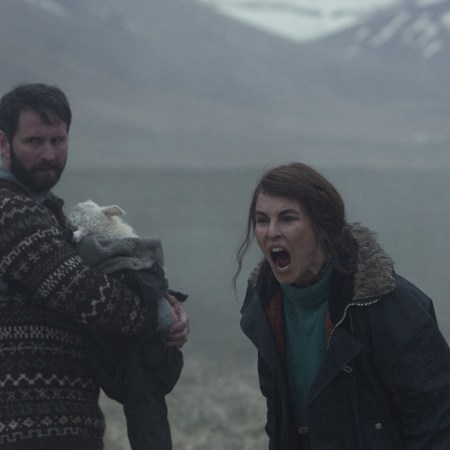Ari Aster wrote Beau Is Afraid with an eye to make it his first feature after graduating from the American Film Institute in 2010, but now that the script has emerged from his desk drawer to plunge cineplexes into its bizarro pocket dimension, viewers might think that he expects it to be his last. It won’t; he’s already hard at work on pre-production for his next picture, “almost certainly” a Western. Even so, his giddily uncommercial new epic of unbridled surrealism spends the twice-proven auteur’s amassed industry cachet with a heedlessness that blows right past “leave it all on the field” and lands somewhere closer to “burn the field and salt the land.” Audacious in its hysterical sprawl, occasionally baffling and inevitably alienating, it’s a ne plus ultra one-for-me project that dares anyone else to attempt entry. Those devotees intrepid or oblivious enough to try will find that the atmosphere on Asterworld, in its purest form, can be hostile. So is everything else.
Our man Beau (Joaquin Phoenix, in a role of such abrasive passivity that it demands one of the greatest living actors just to stand a chance of working) inhabits an immersive off-kilter universe teeming with absurd detail, covered in ads for the goofily sinister mega-corp MW Industries, whose products include the “O’Loha” line of Hawaiian-Irish microwavable dinners and, per the opening credit crawl of studio logos, this movie. We follow him on an odyssey that can be divided into four movements and a coda, the first playing out in a bad-trip backlot that hints at a warped LA, judging by Aster’s personal timeline and the hallucinatory Skid Row imagery. The homeless run amok like zombies out of a conservative’s scaremongering fantasy of city life, streaming into any door left unlocked. A news report warns of a nude vagrant wandering the streets of the town and stabbing citizens without warning. At a sidewalk sale on an overpass, a kid toys with a machine gun. In the background of an impressively layered audio mix, as if buried in the subconscious, we can hear a woman screaming for her lost child.
The anguish of a severed familial bond reverberates through the rest of the film as Beau embarks upon a fraught, digressive journey to pay Mom a visit. That everything along the way wants to kill him — his apartment is infested with brown recluse spiders, futile flyers instructing tenants not to let themselves get bitten — reflects the psychological interior of a man with an extreme anxiety disorder, though he suffers more specifically from the high-octane unleaded neurosis exclusive to nice Jewish boys with overbearing mothers. Aster takes his greatest indulgences not in his willingness to throw every idea he had in the pot, from Tatiesque mise-en-scène comedy to a multimedia interlude that strains for soul-affirming profundity, but in the unabashed nakedness with which he bares his mommy issues. He gazes into his navel until it turns into a wormhole, dives in, and takes us with him.
Beau Is Afraid begins the same way as TV’s Euphoria, with the tranquility of the womb shattered by the screaming existential horror of birth. Where Sam Levinson’s Gen Z soap opera follows a group of teenagers in the thick of their blinkered adolescent vantage, Aster’s portrait of paunchy, balding, undignified middle age burrows inside of a man who never developed past his, still possessed by emotional premises most outgrow: everyone’s against me, everything I do makes somebody mad, I have the most unfair parents in human history. There’s no light poking through the black storm cloud of Beau’s subjectivity, his unmediated (and unmedicated) perspective coloring the dream-logic in use without challenge from its maker’s own presumptive maturities. Here and there, the first round of tweet-reactions and reviews have invoked the concept of a cinematic therapy session not so far from The Fabelmans, another intimate artist’s statement steeped in Jewish guilt, but Aster would rather forge deeper and deeper into his elaborate caricature of dysfunction than attempt to bust through it.
We’re offered no alternative to the fevered recesses of Beau’s own imagination, not even an intimation that space outside his self-made cocoon of angst might somewhere exist. It’s noteworthy that a film so dedicated to full-bore introspection also makes no effort at enlightenment, confirming Beau’s every illogical terror down to a damning final judgement at the hands of the one and only Richard Kind. In a flashback that joins young Beau (played by the uncanny-faced Armen Nahapetian) and his already-single mom on a cruise, he falls for what a viewer could read as a young boy’s impossible impression of a young girl, flighty and tragic and weirdly sexual for a pre-pubescent. When Beau locates her in adulthood, however, he’s elated to find that she’s exactly as he remembers her and that she’s saved a tender touch just for him. The film abides by Beau’s hopes just this once on its way to validating his fears; suffice it to say that what follows will ensure that you’ll never scrub the Freudian stench out of Mariah Carey’s “Always Be My Baby.”
Aster manifests Beau’s sexual hangups with literal-minded metaphor, the meaning unmistakable in a pair of testicles swollen with repressed erotic energy or a giant phallic monster locked in an attic. Considering the sensitivity of the material, there’s a certain thrilling boldness to his more transparent choices. The filmmaker who shrewdly gender-flipped the core dynamic in Midsommar, aware that a movie about his terrible ex would play much better as one woman’s triumphant stand against preening academic-bro masculinity, feels no obligation to cloak a level of shpilkes that makes Woody Allen look laid-back and well-adjusted by comparison. Beyond the ambient unease that sits in your stomach like unmetabolized lactose, sharper and more jarring elements poke out of an unruly id, in particular a slur-dropping teenage girl who bullies Beau into smoking a blunt containing “three different things” and then chugs paint until she dies. The dread trapped in amber around high school age matches the humor, which returns Aster to the puerile sensibility of early shorts like TDF Really Works. (TDF stands for Tino’s Dick Fart.)
The Best Movies, TV and Music for April
Including Ari Aster’s bizarre follow-up to “Hereditary” and the final season of “Barry”The climax arrives along with Beau at his family home, a primal scene hiding horrors hinted at by the exterior’s identical design to the Hereditary house. The long buildup to the reveal of Mona Wassermann — and the fact that she’s portrayed by Patti LuPone, an honorary Jew whose withering stare reduces theatergoing phone-users to a pile of ash — might suggest some fashion of catharsis, a hard-won epiphany that our parents are flawed creatures doing the best they can, or that forgiving even the undeserving opens the gate to inner peace. But no, she just delivers a scorching monologue that compiles a Now That’s What I Call Intrusive Oedipal Thoughts! greatest-hits collection from inside Beau’s brain, then puts him in time-out. This self-flagellation contest ends with no winner, the final shot defiantly rejecting any expectation that all the distance Beau’s traveled might have led him somewhere.
We’re left with the question of whether Aster’s simply having a laugh or baring the innermost contents of his private psyche for the American moviegoing public, though his reticence to discuss his connection to the plot during interviews points toward the latter. That, and his mother’s published poems, one of which reads: “…don’t ask me to talk about the past my memories disgust me they are filled with futile feelings they are accompanied by my exhaustion living in a culture triggered by nothing in particular but self-importance and so I will not bring up this past in case it lasts too long and thrusts you into a dark place…” Going by this Occam’s Razor interpretation, the mere fact of this Caligulan pity party’s existence looks less like a showcase of narcissism and more a feat of creative individualism. Aster convinced A24 to pony up their highest budget ever for a grand monument to his nagging insecurities, and seemingly learned nothing from it. Say what you will about his dementedly ambitious pilgrimage of moping, that it can be sophomoric or self-involved or occasionally tedious. There’s no denying that, like poor Beau, he’s got some massive balls.
This article was featured in the InsideHook newsletter. Sign up now.























